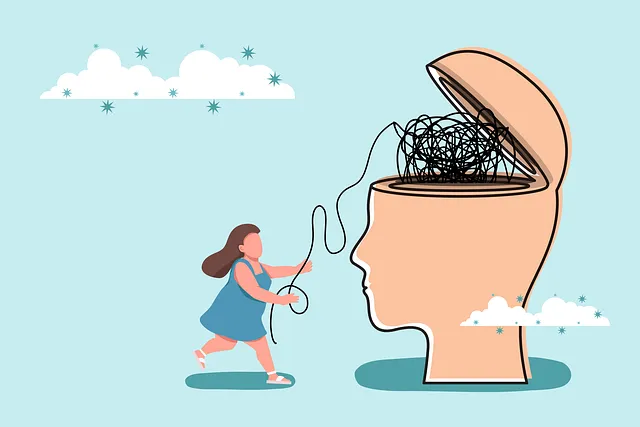Denver Kaiser Permanente prioritizes culturally sensitive mental healthcare, recognizing its impact on patient outcomes. Therapists are trained to understand and respect diverse cultural contexts, incorporating tailored methods like Mind Over Matter and self-care exercises. This approach fosters trust, open communication, and effective treatment plans during mental health appointments, empowering patients from various backgrounds to navigate their journeys. Through specialized training, public awareness campaigns, and resilience-building initiatives, Denver Kaiser Permanente creates an inclusive environment, promoting cultural sensitivity and improved mental well-being for all.
Cultural sensitivity is a cornerstone of quality mental healthcare, ensuring equitable and effective treatment for diverse patient populations. This article explores cultural diversity in mental healthcare, its impact on patient outcomes, and practical strategies for providers. We highlight the innovative approach of Denver Kaiser Permanente, examining their efforts to integrate cultural competence through specific initiatives targeted at improving mental health appointments (Denver Kaiser Permanente mental health appointment number). Understanding these practices is crucial for fostering inclusive and compassionate mental healthcare environments.
- Understanding Cultural Diversity in Mental Healthcare
- The Impact of Cultural Sensitivity on Patient Outcomes
- Strategies for Incorporating Cultural Competence in Practice
- Denver Kaiser Permanente's Approach to Cultural Sensitivity in Mental Health Care Appointment Number
Understanding Cultural Diversity in Mental Healthcare

In the diverse landscape of Denver, where people from various cultural backgrounds converge, understanding and appreciating this diversity in mental healthcare is paramount. The mind and emotions do not operate in a vacuum; they are deeply influenced by an individual’s cultural identity and experiences. Therefore, mental health treatment must be culturally sensitive to truly address the needs of each patient. At Kaiser Permanente Denver, for instance, recognizing that every individual enters therapy with a unique set of beliefs, values, and practices is fundamental to delivering effective care. This involves not only understanding the primary language spoken by patients but also their cultural norms, traditions, and spiritual practices, which can shape their perceptions of mental illness and recovery.
Integrating principles like Mind Over Matter, encouraging Self-Care Routine Development for Better Mental Health, and promoting Self-Awareness Exercises can facilitate this cultural sensitivity. Therapists in Denver Kaiser Permanente are trained to incorporate these tools while respecting the patient’s cultural context, ensuring that treatment plans are not just therapeutic but also culturally relevant and accessible. By doing so, healthcare providers foster an environment where patients feel understood, valued, and empowered to navigate their mental health journeys successfully.
The Impact of Cultural Sensitivity on Patient Outcomes

Cultural sensitivity in mental healthcare plays a pivotal role in shaping patient outcomes and fostering meaningful healing. When mental health professionals approach their practice with an awareness of diverse cultural backgrounds, beliefs, and values, they create an environment that encourages open communication and builds trust. This understanding goes beyond mere knowledge; it involves adapting therapeutic methods to align with each patient’s unique cultural context, ensuring the interventions are not only effective but also culturally acceptable.
For instance, at Denver Kaiser Permanente, mental health appointments number includes a dedicated focus on cultural sensitivity as a key component of care. By integrating compassion cultivation practices and burnout prevention strategies, healthcare providers promote emotional well-being promotion techniques that resonate with diverse patient populations. This holistic approach not only enhances therapeutic outcomes but also strengthens the patient-provider relationship, ultimately contributing to improved mental health and overall quality of life for all individuals served.
Strategies for Incorporating Cultural Competence in Practice

Incorporating cultural competence into mental healthcare practice is a multifaceted process that requires intentional strategies to ensure equitable care for all individuals. At Denver Kaiser Permanente, mental health professionals can start by proactively learning about their patients’ cultural backgrounds and beliefs. This knowledge enables them to create a safe and welcoming environment, where patients feel understood and respected. Encouraging open communication, actively listening, and asking culturally sensitive questions during appointments (e.g., through the Denver Kaiser Permanente mental health appointment number) helps build trust and facilitates meaningful interactions.
Moreover, integrating Public Awareness Campaigns Development and Mental Illness Stigma Reduction Efforts into routine practice can significantly enhance cultural sensitivity. Educating both patients and staff about diverse cultural perspectives fosters an inclusive atmosphere. Resilience Building initiatives also play a crucial role in promoting culturally responsive care by empowering individuals to navigate challenges unique to their backgrounds. Through these strategies, mental health professionals at Denver Kaiser Permanente can offer tailored support, ensuring that every patient receives compassionate, effective treatment.
Denver Kaiser Permanente's Approach to Cultural Sensitivity in Mental Health Care Appointment Number

Denver Kaiser Permanente has made significant strides in integrating cultural sensitivity into its mental health care practices. The organization recognizes that a patient’s cultural background significantly influences their mental well-being and treatment outcomes. To address this, they’ve implemented specialized training programs for their healthcare professionals, focusing on enhancing cultural competency and understanding diverse therapeutic approaches.
Through these initiatives, Denver Kaiser Permanente aims to create a welcoming and inclusive environment during every mental health appointment (Denver Kaiser Permanente mental health appointment number). By fostering cultural sensitivity, the organization promotes self-esteem improvement and resilience building among patients from various ethnic and cultural groups. This holistic approach ensures that each individual receives tailored care, respecting their unique perspectives and beliefs while navigating the challenges they face.
Cultural sensitivity in mental healthcare is no longer a consideration, but an imperative. As diverse communities seek support, understanding and addressing cultural diversity is crucial for positive patient outcomes. Denver Kaiser Permanente’s commitment to this aspect is evident through their approach and the success reflected in the mental health appointment number. By implementing strategies that foster cultural competence, healthcare providers can create inclusive environments, bridge communication gaps, and ultimately improve access to quality care for all.






